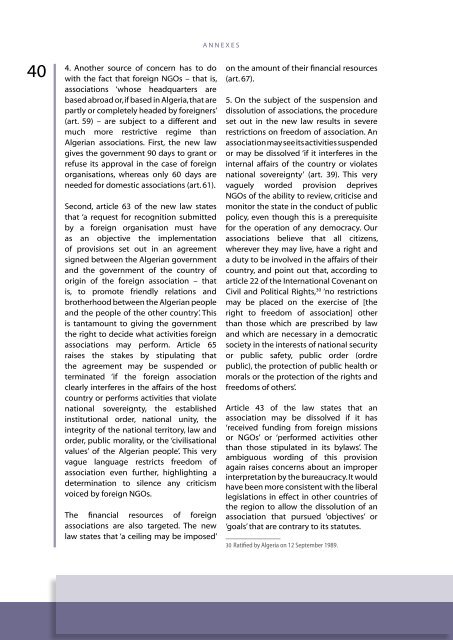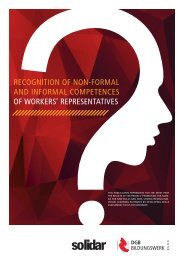Algeria - Solidar
Algeria - Solidar
Algeria - Solidar
You also want an ePaper? Increase the reach of your titles
YUMPU automatically turns print PDFs into web optimized ePapers that Google loves.
A N N E X E S<br />
40<br />
4. Another source of concern has to do<br />
with the fact that foreign NGOs – that is,<br />
associations ‘whose headquarters are<br />
based abroad or, if based in <strong>Algeria</strong>, that are<br />
partly or completely headed by foreigners’<br />
(art. 59) – are subject to a different and<br />
much more restrictive regime than<br />
<strong>Algeria</strong>n associations. First, the new law<br />
gives the government 90 days to grant or<br />
refuse its approval in the case of foreign<br />
organisations, whereas only 60 days are<br />
needed for domestic associations (art. 61).<br />
Second, article 63 of the new law states<br />
that ‘a request for recognition submitted<br />
by a foreign organisation must have<br />
as an objective the implementation<br />
of provisions set out in an agreement<br />
signed between the <strong>Algeria</strong>n government<br />
and the government of the country of<br />
origin of the foreign association – that<br />
is, to promote friendly relations and<br />
brotherhood between the <strong>Algeria</strong>n people<br />
and the people of the other country’. This<br />
is tantamount to giving the government<br />
the right to decide what activities foreign<br />
associations may perform. Article 65<br />
raises the stakes by stipulating that<br />
the agreement may be suspended or<br />
terminated ‘if the foreign association<br />
clearly interferes in the affairs of the host<br />
country or performs activities that violate<br />
national sovereignty, the established<br />
institutional order, national unity, the<br />
integrity of the national territory, law and<br />
order, public morality, or the ‘civilisational<br />
values’ of the <strong>Algeria</strong>n people’. This very<br />
vague language restricts freedom of<br />
association even further, highlighting a<br />
determination to silence any criticism<br />
voiced by foreign NGOs.<br />
The financial resources of foreign<br />
associations are also targeted. The new<br />
law states that ‘a ceiling may be imposed’<br />
on the amount of their financial resources<br />
(art. 67).<br />
5. On the subject of the suspension and<br />
dissolution of associations, the procedure<br />
set out in the new law results in severe<br />
restrictions on freedom of association. An<br />
association may see its activities suspended<br />
or may be dissolved ‘if it interferes in the<br />
internal affairs of the country or violates<br />
national sovereignty’ (art. 39). This very<br />
vaguely worded provision deprives<br />
NGOs of the ability to review, criticise and<br />
monitor the state in the conduct of public<br />
policy, even though this is a prerequisite<br />
for the operation of any democracy. Our<br />
associations believe that all citizens,<br />
wherever they may live, have a right and<br />
a duty to be involved in the affairs of their<br />
country, and point out that, according to<br />
article 22 of the International Covenant on<br />
Civil and Political Rights, 30 ‘no restrictions<br />
may be placed on the exercise of [the<br />
right to freedom of association] other<br />
than those which are prescribed by law<br />
and which are necessary in a democratic<br />
society in the interests of national security<br />
or public safety, public order (ordre<br />
public), the protection of public health or<br />
morals or the protection of the rights and<br />
freedoms of others’.<br />
Article 43 of the law states that an<br />
association may be dissolved if it has<br />
‘received funding from foreign missions<br />
or NGOs’ or ‘performed activities other<br />
than those stipulated in its bylaws’. The<br />
ambiguous wording of this provision<br />
again raises concerns about an improper<br />
interpretation by the bureaucracy. It would<br />
have been more consistent with the liberal<br />
legislations in effect in other countries of<br />
the region to allow the dissolution of an<br />
association that pursued ‘objectives’ or<br />
‘goals’ that are contrary to its statutes.<br />
30 Ratified by <strong>Algeria</strong> on 12 September 1989.

















